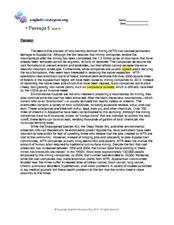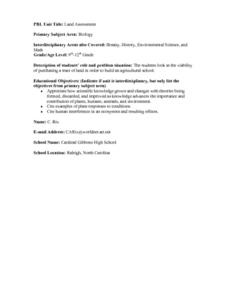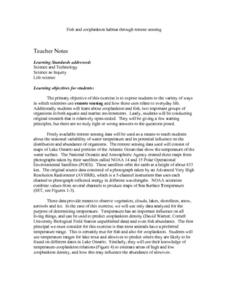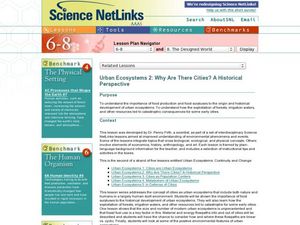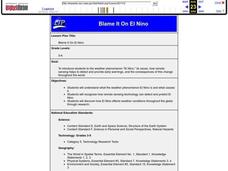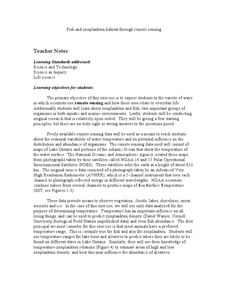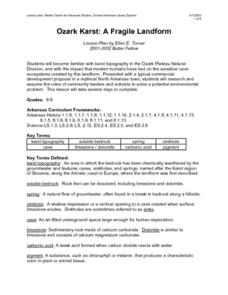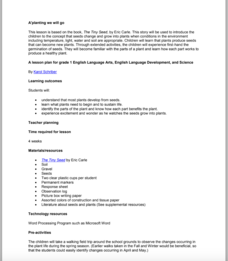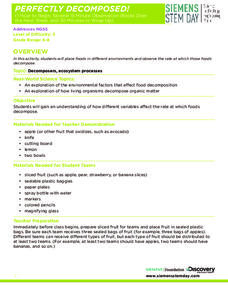Curated OER
Reading Comprehension 5: Level 10
Whether used as a reading comprehension assessment, as the basis of a mini-lesson on reading strategies, or as extra practice, this exercise will prove to be valuable because of the answers and explanation key that accompanies the...
Curated OER
Land Assessment
Students work in small groups on a problem based learning activity. Students are presented with a problem of buying land to use for educational purposes only and must determine if it is feasible to buy it based on soil analysis and plant...
Curated OER
It's Natural!
Here's a nicely designed learning exercise that will allow your young scientists to learn about common materials and products that come from nature. They also looks at synthesized products that come from a factory. This simple matching...
Curated OER
Fish and zooplankton habitat through remote sensing
Students are exposed to the variety of ways in which scientist use remote sensing and it used in everyday life. They investigate about zooplankton and fish. Students list the two important groups of organisms in both aquatic and marine...
Curated OER
Examining the Stages in Ecological Succession
For this ecosystems worksheet, students use illustrations and descriptions of four ponds to determine the order of succession. Students complete 8 fill in the blank questions and 5 short answer questions.
Curated OER
Urban Ecosystems 2: Why Are There Cities? A Historical Perspective
Middle schoolers investigate the importance of food surpluses to the historical development of urban ecosystems.
Curated OER
Lead and Mercury Ion Catalase Inhibition
Students participate in a laboratory investigation in which they observe the effect of temperature and pH on enzyme activity. Students also examine exposure to heavy metal ions and the effect that may have on enzyme activity.
Maine Math & Science Alliance
Earth as a System
Ecosystem, human body system, weather system. We hear the word system a lot, but what does it really mean? In the activity, pairs or groups of learners discuss how a bicycle is a system and then analyze objects in their classroom and...
Curated OER
Bromine: An Important Arkansas Industry
Arkansas ranks first in the entire world in the production of bromine! Here is a lesson which guides middle schoolers through a study about the formation and history of Arkansas' bromine reserves. They also looks at the many uses of...
Curated OER
Don't Let the Earth Down
Writing a persuasive argument starts with a clear thesis. Using this resource, your class will write a persuasive paper on a conservation issue. They will then transform their argument into a 30-second public service announcement. If...
Curated OER
Don't Let the Earth Down
Although recycling is definitely beneficial, reducing our waste and conserving our natural resources should really be the focus of environmentalists. Encourage the future generation to create a public service announcement about a...
Curated OER
Pond Ecology
A lab activity is a great way to incite thoughtful questioning and scientific processes. Pupils will collect organisms with a Petri dish, make observations, sketch the organism, ask questions, then attempt to identify the specimen...
Teach Engineering
Basically Acidic Ink
If you don't want to drink red cabbage juice, here's another use for it—a decoder! Using vinegar and ammonia-based window cleaning liquids as invisible inks, scholars create designs in the second lesson of the series. Red cabbage juice...
Beyond Benign
Daphnia Bioassay LD50
De-icing materials may have a harmful effect on our environment; have your class perform an experiment to test the nature of these effects. Scholars monitor the survival rate of a sample of daphnia as the concentration of a de-icing...
Curated OER
Blame It On El Nino
Students study the weather phenomenon El Nino is and what causes it, and recognize how remote sensing technology can detect and predict El Nino. Students discover how El Nino affects weather conditions throughout the globe through research.
Curated OER
Wetlands Are Wonderful
Students study the characteristics of wetlands. They are introduced to terms and different examples of wetlands. The hands-on activity reinforces the different parts of the wetlands, and provides a working model of a wetland.
Curated OER
Fish and Zooplankton Through Remote Sensing
Ecology aces examine sea surface temperature maps and relate temperatures to concentration in fish and zooplankton populations. Take your class to a computer lab and provide experience with actual remote sensing data. Some of the links...
Curated OER
Urban Ecosystems 4: Metabolism of Urban Ecosystems
Students discover that material and energy uses by a city come from outside the city boundaries. They realize that the pathway of these material is linear instead of cyclical as they are in natural ecosystems.
Curated OER
Ecosystem Lesson Plan: Food Chain/Food Web
Students discuss ecosystems, eliciting their current knowledge of an ecosystem. Students receive an Ecosystems document and look at the picture. Students brainstorm connection between the cover picture and ecosystems. The indicated...
Curated OER
Ozark Karst: A Fragile Landform
Young geologists become familiar with the Karst Topography in the Ozark Mountains. They study how human activity has affected the cave ecosystem. They conduct a simulation in which a large development is proposed in the area, and they...
Curated OER
Earth: Our Big Blue Marble
Students investigate Earth and its resources. In this Earth, space, and nature lesson plan, students collaborate to design presentations on the Earth, its cycles, and how humans have impacted the planet. Images, diagrams, and background...
Curated OER
A'planting We will Go
Germination is an amazing process that results in amazing things. The book The Tiny Seed is the inspiration for a set of activities that will help build early literacy, observation, language, and writing skills. The class observes how...
Chicago Botanic Garden
Historical Climate Cycles
Scientists use ice core samples to obtain temperatures of the earth from 400,000 years ago! The third of five lessons instructs pupils to interpret historical climate data to see changes over time. In part I, participants interpret...
Discovery Education
Perfectly Decomposed!
We all know someone who won't eat the banana with a brown spot, the grape with a dimple, and the apple with a bruise. Scholars use different fruits to explore what happens when fruits really start to decompose. They set up an experiment...


